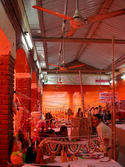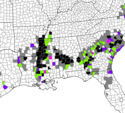You can find the future of the world’s women not in Scandinavia or the U.S., but among the entrepreneurs who line the streets of Mumbai, Manila and Sao Paulo. Selling everything from mangoes to home-made blouses, these women, usually considered the very bottom of their home country’s employment barrel, represent the cutting-edge of progress for women in the 21st century. read more »
Demographics
Women Ascendent: Where Females Are Rising The Fastest
Domestic Migration: Returning to Normalcy?
Even as the troubled economy has continued to hobble along, there may be hints that the domestic migration patterns from before the Great Financial Crisis could be returning at least in some states. This is evident in the recent national interstate migration data from the American Community Survey. This analysis reviews annual interstate migration data from the beginning of the Great Financial Crisis to 2010, with broad comparisons to earlier (2001-2006) data from the Census Bureau population estimates program (Note 1). read more »
- Login to post comments
Back to the City?
The 2010 Census results were mostly bleak for cities, especially for those who believed the inflated hype about the resurgence of the city at the expense of the suburbs. Despite claims of an urban renaissance, the 2000s actually turned out to be worse than the 1990s for central cities. The one bright spot was downtowns, which showed strong gains, albeit from a low base. The resurgence of the city story seemed largely fueled by intra-census estimates by the government that proved t read more »
Brand Loyalty Dominates Trip to Work
Many public sector mavens watch like the Dow Jones average the shares of workers using various modes of transportation on work trips to see how their favorite mode is doing. One shouldn’t be surprised when a certain hyperbole creeps into the interpretation of the trends. But in reality not a whole lot is changing, despite many assertions of ballooning growth from some sectors. read more »
More Americans Move to Detached Houses
In defiance of the conventional wisdom in the national media and among most planning professionals, Americans continue not only to prefer, but to move into single family detached houses. Data from the 2010 American Community Survey indicates that such housing attracted 79.2% of the new households in the 51 major metropolitan areas (over 1,000,000 population) over the past decade. read more »
Arab Spring - American Winter
2011 brought us the Arab Spring, a year of protests, turmoil, and revolution. 2012 will usher in the American Winter, a new era of withdrawal and separation for America and the Middle East. Contrary to conventional wisdom, America is poised to step back from the dominant role it has played in the Middle East since 1948.
The author has traveled to the Middle East for more than two decades during which time there was little change among the dictators, strongmen and mullahs that ruled the desert lands. read more »
Overpopulation Isn't The Problem: It's Too Few Babies
The world’s population recently passed the 7 billion mark, and, of course, the news was greeted with hysteria and consternation in the media. “It’s not hard to be alarmed,” intoned National Geographic. “We should all be afraid, very afraid,” warned the Guardian. read more »
Major Metropolitan Commuting Trends: 2000-2010
As we indicated in the last article, solo automobile commuting reached an all time record in the United States in 2010, increasing by 7.8 million commuters. At the same time, huge losses were sustained by carpooling, while the largest gain was in working at home, which includes telecommuting. Transit and bicycling also added commuters. This continues many of the basic trends toward more personalized employment access that we have seen since 1960. read more »
America's Demographic Opportunity
Among the world’s major advanced countries, the United States remains a demographic outlier, with a comparatively youthful and growing population. This provides an unusual opportunity for America’s resurgence over the next several decades, as population growth elsewhere slows dramatically, and even declines dramatically, in a host of important countries. read more »
A Century of Change in the US Black Population, 1910 to 2010
2010 was the 100th anniversary of the start of the “Great Migration” of the “Negro” population to northern cities from the mainly rural South. The midway point occurred in 1960 when black urban population was beginning to peak. read more »




















